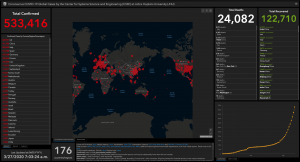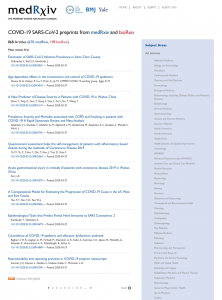Friday 27 March 2020

Lahore’s Badshahi Mosque – Pakistan has made an interesting decision and permitted Friday prayers
When events are moving fast, those working at the frontline can find it difficult to be heard. They are so busy keeping others together, and themselves as well, that to get their message to the world can be an uphill struggle. Sometimes, the organisations for which they work will also forbid them from making announcements or declaring a personal view. Big Brother must give approval and can be unbearably slow.
Covid-19 is a perfect example. If a group of medics wishes to submit a report on a finding that could lead to a rapid cure, they would normally seek permission from the bigwigs, then write a scientific paper and finally submit it to a journal. There would then follow several weeks, sometimes months of waiting, while the paper is sent to reviewers who will decide whether the submission is any good. This is peer review. Few papers are accepted first shot. Most will need revision. The full process, from submission to publication, can take many months, sometimes even years.
For Covid-19, as it motors around our world like an express train, picking off economies and people as it goes, a delay in announcing a key finding can be fatal. This is where preprint servers come in. These are online sites where scientific work can be posted, but without being peer reviewed. The papers on a preprint server may subsequently be published in a formal scientific journal, with its associated kudos, but the aim of the server is to spread a message at speed. The world can then see it and act as it sees fit.
One popular preprint server is Med-Archive, which is written as medRχiv. It was founded by Cold Spring Harbor Laboratory, Yale University and the British Medical Journal, and today is thriving. If you want to know how researchers are thinking at this very millisecond, medRχiv is where you should go. Today for example, 27 March 2020, there have been 76 separate papers submitted, from countries right around the globe. Since the pandemic started there have been 868 papers in total on medRχiv. This number includes submissions to another preprint server for biology, bioRχiv.
What are some of these authors saying? The findings are truly fascinating. From London we learn that there is a strong age dependence in the probability of developing clinical symptoms, rising from around 20% in the under 10s to more than 70% in older adults. The authors also say that interventions aimed at halting transmission in children may have an only limited effect on preventing cases. Whose idea was it to recommend school closures?
From Wuhan in China, a new predictor of disease severity has been proposed, where the results of three blood tests can be multiplied together and if they go above a certain value, which happens to be 5.32, you are likely to do worse rather than better with Covid-19.
From Takahashi in Japan, researchers are trying to predict when herd immunity has been achieved. If that is known, then normal living can resume, and economies start to recover. The authors provide a means of predicting this and conclude that their approach “will lay the foundation … to support political decisions on infection control.” UK Government, please read.
From Tehran in Iran, comes research reporting that an increase in problems with the ability to smell has occurred at the same time as a surge in Covid-19. Somehow the two appear related. I am hoping that my inability to smell the stew being cooked for me as I write does not imply I am harbouring something unpleasant. It may just be the stew.
Meanwhile workers from Berkeley in the USA have estimated that if left unchecked, early infections with Covid-19 exhibit exponential growth rates of roughly 45% per day. They also say that similar policies for infection control may have different impacts on different populations. I was very pleased to learn from them that worldwide efforts have already prevented or delayed some 80 million infections. That is huge. I will continue to self-isolate and venture out only on occasion.
On this single date of 27 March 2020, there is other work from Canada, Italy, Israel, Australia, India, Brazil,South Korea, Chile, The Netherlands, Austria, and other countries, too. Perhaps my favourite is a paper from China, which reports that efforts to contain Covid-19 have led to air quality improvement that have brought health benefits which outnumber the confirmed deaths from the virus. Who said Nature was not all-powerful? Will someone please tell Greta Thunberg?
For those of us in lockdown, and worried that a coronavirus has just wriggled through the letterbox, medRχiv is reassurance that this pandemic is not all about politicians and soundbites. There are many serious brains actively seeking a solution.

The situation this morning – 27 March 2020 (courtesy Center for Systems Science and Engineering at Johns Hopkins University)
There is still much discussion about PPE and healthcare staff finding it difficult to obtain. Many have had to find their own and a few have even had to visit the local hardware store for mask and goggles. As there is no way of knowing who has the disease and who has not, particularly in the early stages, staff have said they would like to wear PPE for every consultation. And why not? It seems a reasonable request to me.
The USA has now overtaken China with the largest number of cases and is clearly in for an epic few weeks ahead. Trump has attributed this rise in cases to testing. He may just be correct.
Meanwhile Pakistan is being extraordinarily brave and allowing Friday prayers to continue. Good luck to them is all I can say. That said, the provincial government in Sindh, one of the four provinces of Pakistan, and which has the most recorded cases in the country, has taken the lead and ordered that only up to five people can offer joint prayers in a mosque. At least someone is vaguely thinking.
Covid-19 is picking us off one by one. So far, I have been lucky, which is more than I can say for our Prime Minister, Boris Johnson, who has turned out to be positive. He is now in self-isolation, although I doubt he is co-located with his pregnant wife. It is not only the PM, but Matt Hancock, the Health Secretary, too. Number Ten, our Prime Minister’s London home, is clearly a pestilent location. A fair number of people have exited its doors infected.

Take this virus seriously. Julie A, aged 16 years, did not intend to perish
Sadly, today, we received the news of the death not only of a much-loved GP from Essex, who initially presented with classic symptoms, but of a 16-year-old girl who died in Paris. Julie, who had no underlying health problems, started coughing on 21 March and was dead five days later. Her mother was reported to have said, “From the start, we were told that the virus doesn’t affect young people. We believed it, like everyone else.”
Any death is a tragedy and these days there are plenty, but 16 years of age? That is much too young.

